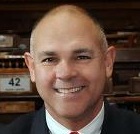By Bob Allen
A tax rebate tailored to benefit a single Georgia Baptist college was slipped into a 49-page spending bill passed by the Georgia legislature just before this year’s lawmaking session expired April 2.
 State Sen. Bruce Thompson, a Republican from White, Ga., introduced a line item to create a loophole exempting a private college enrolling between 1,000 and 3,000 students from paying sales tax on the purchase and use of construction materials for one year beginning in July 1, up to a maximum rebate of $350,000.
State Sen. Bruce Thompson, a Republican from White, Ga., introduced a line item to create a loophole exempting a private college enrolling between 1,000 and 3,000 students from paying sales tax on the purchase and use of construction materials for one year beginning in July 1, up to a maximum rebate of $350,000.
While up to 15 Georgia schools could qualify for the benefit, a fiscal note to lawmakers estimating the bill’s financial impact references only Truett-McConnell College, a Georgia Baptist Convention-affiliated school in the midst of a campaign to build a $13 million student recreation center on the campus in Cleveland, Ga.
Thompson, a member of First Baptist in Cartersville, Ga., and a Truett-McConnell trustee, told the Associated Press he sponsored the exemption at the request of college officials. He said he didn’t think it was a big deal, comparing it to Americans who file an itemized tax return in order to take advantage of benefits and options offered to them.
Truett-McConnell President Emir Caner told the news service he would like to see the state give a blanket sales tax exemption for any private school building, arguing it’s potentially one less capital project needed by the public higher education system at taxpayer expense.
Truett-McConnell trustees voted unanimously last May to endorse a 14-month capital campaign for the construction of a 69,000-square-foot facility featuring an eight-lane accessible swimming pool, two racquetball courts, three basketball courts, an elevated running track, training equipment and a restaurant.
Named the George Blaurock Student Recreation Center in memory of a founder of the Anabaptist movement burned at the stake for rejecting infant baptism in 1529, students quickly dubbed the new center “The Rock.”
“Once home to a few hundred students, our college now enrolls more than 1,600 students residentially and online,” Caner said in a news story published May 16, 2014, in Baptist Press. “It is both incumbent and necessary that we radically transform the campus to give us the ability to radically transform as many lives for Christ as God would send to us.”
In 2010 Truett-McConnell announced an $8 million expansion, at the time the largest in the school’s history, to fund three building projects including space for The Creation Research Center launched in 2009 led by Kurt Wise, a young-earth creationist who taught 17 years at Bryan College in Dayton, Tenn., before teaching briefly at Southern Baptist Theological Seminary in Louisville, Ky.
In 2012 Caner announced plans for a 2,250-seat chapel costing $17 million. An official said last year those plans are still viable, but they took a back seat to the rec center because of the addition of new athletic programs and growing student enrollment.
The Associated Press said this isn’t the first time Georgia lawmakers have given private schools a break, and legal scholars said the construction exemption would likely survive a legal challenge. It seems to fall within the legislature’s conflict-of-interest policy, which instructs members not to vote on a bill if they or a family member have a personal financial interest.
Critics said policy-wise the exemption makes little sense. “I would hate to see the situation where anytime an entity wants to build something, they apply for a sales tax exemption,” State Sen. Nan Orrock, an Atlanta Democrat who voted against the measure, told the AP.
Legal scholars quoted by the news service said it’s unclear if Truett-McConnell’s religious ties might conflict with a ban in the state constitution on use of public money for direct or indirect aid “of any church, sect, cult, or religious denomination or of any sectarian institution.”
